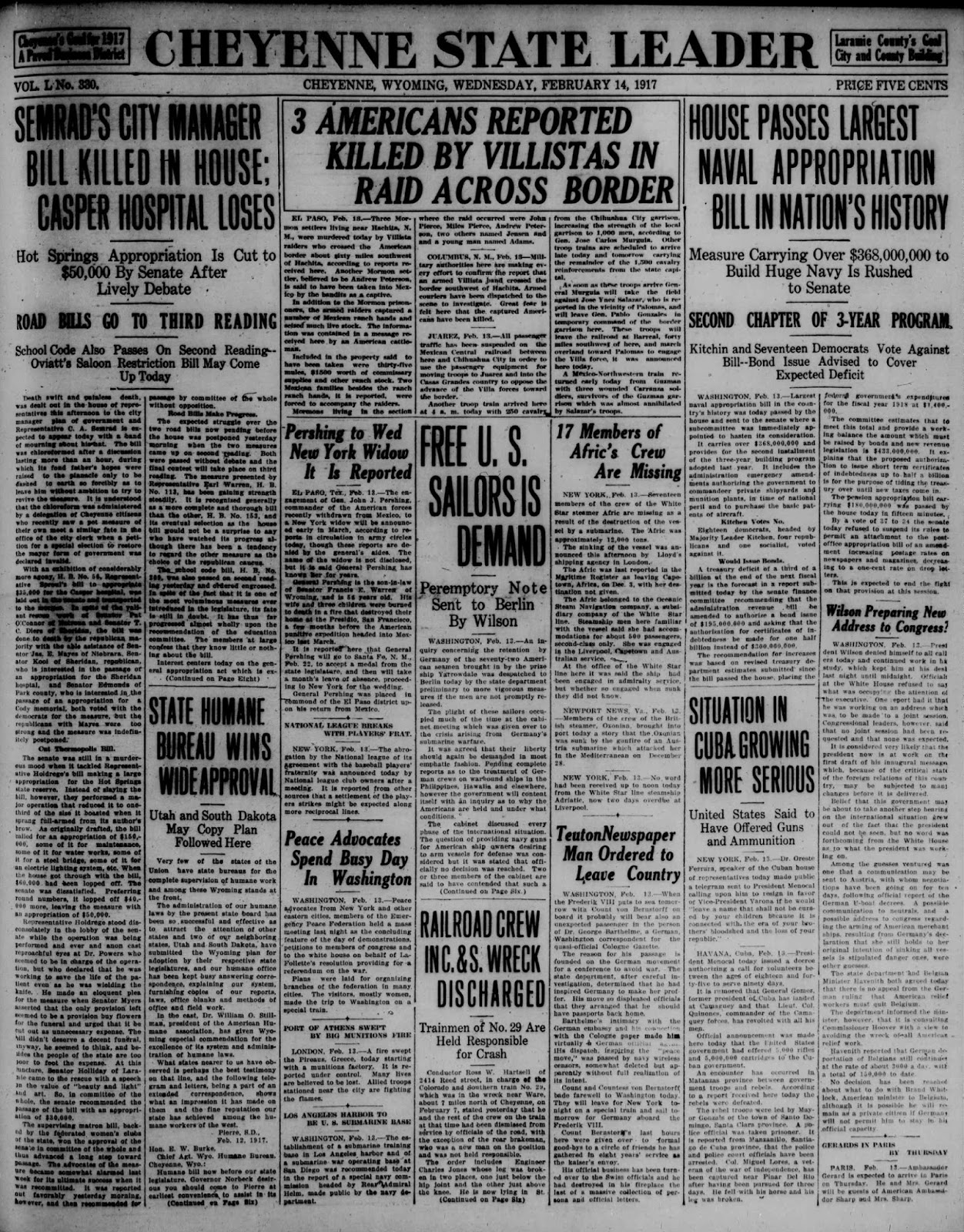Or maybe just men in February.
I've been posting some newspapers recently, as they've been again been featuring Mexico and our troubles with it in 1917. But at the same time, there's been some really odd stories popping up.
Earlier in the week in a newspaper that I didn't put up there was a news story about a group of young men from Denver, all apparently of prominent families, in 1917, that were arrested and were clearly going to be convicted of violating the Mann Act. That statute, for those who might not be familiar with it, makes it a crime to take a woman across state lines for immoral purposes, which is what they did. Or rather, they took girls across as it reported that the girls danced for them sans clothing, with one being as young as 16 years of age. One of the young men was reported to be "getting a divorce".
Yeah, I bet he was.
And then yesterday we find that in Kemmerer there was a problem with "bear dancing". Well, there was also a problem with the headline writer at The Wyoming Tribune that day, as it wasn't "bear dancing", but rather females dancing bare. The saloons were ordered to knock it off.
The Wyoming Tribune for February 14, 1917. I'd like to see a saloon that featured dancing bears.
That's more like it.
Surprisingly the saloons were resisting the order, including the bear dancers, um, the bare dancers.
I should note that this past week, in 1917, was the week that Mata Hari was arrested, speaking of bare dancers.
I should note that this past week, in 1917, was the week that Mata Hari was arrested, speaking of bare dancers.
Now, I would not have thought that bare dancing was really a thing in very many saloons in 1917. I guess it fits in with the gritty Sam Peckinpah version of the West, but not really the real West as I'd have imagined it. But maybe I was off the mark.
Moreover, I wouldn't have thought bare dancing in saloons a common thing in the West in 1917, let alone in Lincoln County, Wyoming. Kemmerer is part of the Mormon Hub of Eastern Wyoming and I'm certain that the Mormon's do not approve of dancing bare. Of course, they don't approve of saloons either to it would be safe to assume that whomever the patrons of the saloons were they were likely not practicing Mormons.
I'm a practicing Catholic which brings me to this. I don't approve of bare dancing in saloons either nor do I approve of Sports Illustrated's annual descent into pornography. That occurs, yes, in February.
Every year at this time Sports Illustrated takes a break from covering football, basketball, baseball and lawn tennis or whatever else it covers, and just goes flat out pornographic. I'm not sure how it chose February for its descent, but it may have something to do with it being the depth of winter (take that, January) or perhaps its because its truly the sports "garbage time".
No, not that Garbage Time. This one actually deals with sports.
Or perhaps its because its the depth of winter and, as the old saying goes, idleness truly is the devil's playground. Indeed, that would explain why young Denverites were hauling girls up into Cheyenne to dance for them sans clothing and why guys were hanging around in Kemmerer bars drinking and watching dancing bears. . .um bare dancing.
Anyhow, there is a serious side of this. 1917 was in the hard swing towards women's suffrage and it was shortly thereafter achieved in most of the Western World.
Bare or Bare dancing? Forget that. Vote.
The vote was a major strike in favor of women's equality with men. And true equality, not one that ignored their gender but respected it.
Bare dancing, let alone violating the Mann Act, certainly doesn't respect it. Nor does plastering it all over the pages of Sports Illustrated and claiming that it celebrates swimwear (which, I'd note, I don't think they really particularly even claim now as the swimwear is hardly there or indeed is actually absent). That's exploitation.
And as long as women are exploited in that fashion, not matter what their hopes and aspirations were in 1917, they'll never really be equal. An object isn't equal. It's an object.
Something to ponder, I guess, in muddy February.





















